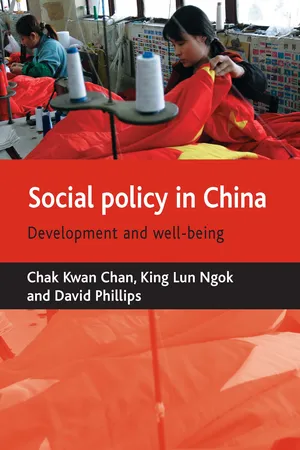
- 248 pages
- English
- PDF
- Available on iOS & Android
About this book
This much-needed new textbook introduces readers to the development of China's welfare polices since its conception of an open-door policy in 1978. Setting out basic concepts and issues, including key terms and the process of policy making, it overcomes a major barrier to understanding Chinese social policy. The book explores in detail the five key policy areas of employment, social security, health, education and housing. Each is examined using a human well-being framework comprising both qualitative and quantitative data and eight dimensions: physical and psychological well-being, social integration, fulfilment of caring duties, human learning and development, self-determination, equal value and just polity. This enables the authors to provide not only factual information on policies but also an in-depth understanding of the impact of welfare changes on the quality of life of Chinese people over the past three decades. A major strength of the book lies in its use of primary Chinese language sources, including relevant White Papers, central and local government policy documents, academic research studies and newspapers for each policy area. There are very few books in English on social policy in China, and this book will be welcomed both by academics and students of China and East Asian studies and comparative social policy and by those who want to know more about China's social development.
Frequently asked questions
- Essential is ideal for learners and professionals who enjoy exploring a wide range of subjects. Access the Essential Library with 800,000+ trusted titles and best-sellers across business, personal growth, and the humanities. Includes unlimited reading time and Standard Read Aloud voice.
- Complete: Perfect for advanced learners and researchers needing full, unrestricted access. Unlock 1.4M+ books across hundreds of subjects, including academic and specialized titles. The Complete Plan also includes advanced features like Premium Read Aloud and Research Assistant.
Please note we cannot support devices running on iOS 13 and Android 7 or earlier. Learn more about using the app.
Information
Table of contents
- Social policy in China
- Contents
- List of tables and figures
- List of abbreviations
- Currency equivalents
- Preface
- Part 1: Background and framework
- Part 2: Key policy areas and well‑being
- Part 3: Conclusion
- Index